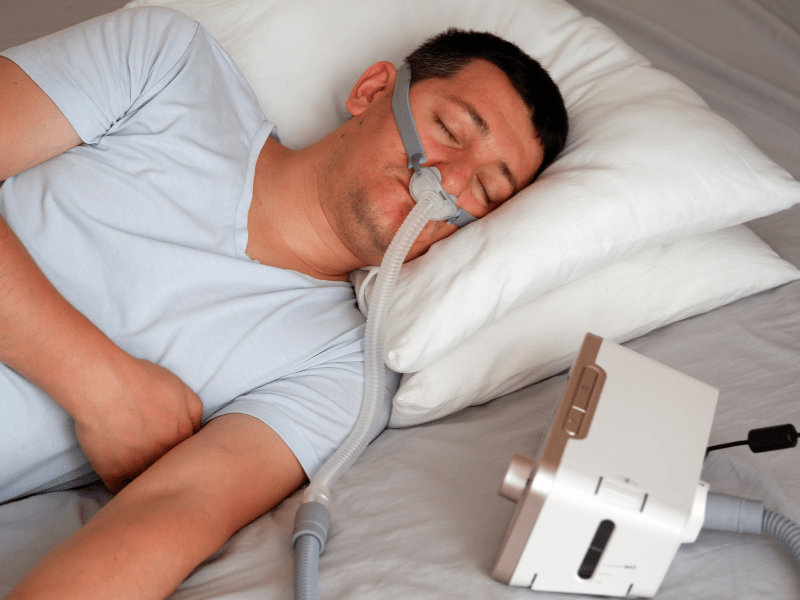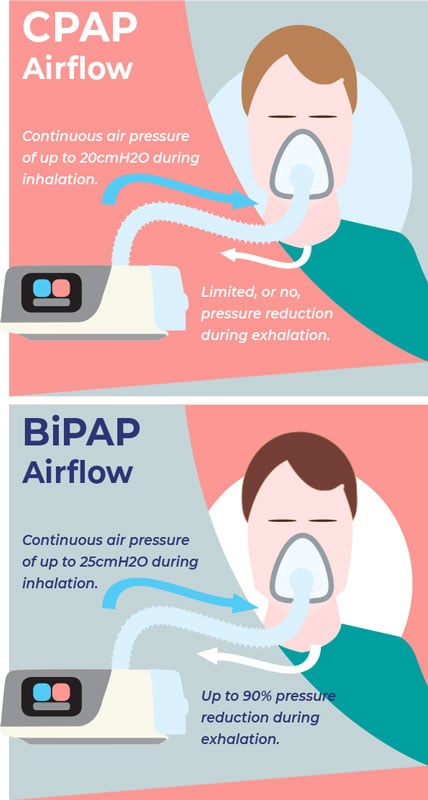Convenient BiPAP Rental Solutions with Quick Shipment
Bipap vs. CPAP: Which Is the most effective for Your Rest Disorder?
When browsing the complexities of rest problems, the option in between BiPAP and CPAP therapy is an important consideration. Each modality supplies distinct advantages tailored to specific conditions, yet the decision depends upon private patient needs and comfort levels. While CPAP offers a consistent air flow suitable for obstructive sleep apnea, BiPAP's twin pressure setups may enhance convenience for those with even more detailed respiratory problems. Understanding these differences can dramatically impact treatment efficacy, leaving one to ponder which alternative genuinely aligns with their health and wellness needs and lifestyle.
Recognizing Sleep Disorders
Rest disorders encompass an array of problems that disrupt normal rest patterns, influencing both the high quality and period of rest. These disorders can show up in different forms, including sleep problems, rest apnea, narcolepsy, uneasy leg disorder, and parasomnias. Each problem provides special challenges, typically leading to significant daytime tiredness, cognitive problems, and emotional disturbances.
Sleep problems is characterized by trouble dropping or staying asleep, while sleep apnea entails duplicated interruptions in breathing during sleep, commonly resulting in fragmented remainder. Narcolepsy, on the other hand, is noted by excessive daytime sleepiness and sudden sleep assaults. Uneasy leg syndrome causes uncomfortable feelings in the legs, prompting an uncontrollable desire to move them, which can additionally hinder the capacity to drop off to sleep.
The effect of sleep disorders extends past specific health and wellness, influencing general efficiency, connections, and high quality of life. Comprehending the details nature of each problem is critical for effective diagnosis and treatment. As sleep health and wellness ends up being significantly acknowledged as a crucial component of total wellness, attending to these conditions is essential for boosting both sleep top quality and daily performance.
Just How CPAP Works
Continuous Favorable Air Passage Stress (CPAP) treatment is often employed as a key treatment for obstructive sleep apnea (OSA) The device of CPAP entails the use of a machine that delivers a steady stream of air through a mask worn throughout rest. This air movement preserves favorable stress in the air passage, preventing the collapse or obstruction of the throat that can occur during sleep.
When a client takes a breath in, the CPAP device supplies a constant flow of air, guaranteeing that the respiratory tract remains open - BiPAP Rental. This not just reduces the signs of OSA, such as snoring and interrupted sleep patterns, however likewise minimizes the associated health risks, including cardiovascular issues and daytime tiredness
The stress settings on a CPAP device can be customized to meet specific patient needs, frequently identified through a sleep research study. Overall, CPAP therapy has been revealed to dramatically boost the high quality of rest and overall health for individuals suffering from obstructive rest apnea.
Exactly How BiPAP Works
BiPAP, or Bilevel Favorable Air Passage Pressure, is a specific form of non-invasive ventilation that is especially valuable for clients with problems such as complicated sleep apnea or breathing disorders. Unlike CPAP, which provides a continuous stream of air at a solitary pressure, BiPAP gives 2 unique stress setups: a higher inspiratory stress for inhalation and a reduced expiratory stress for exhalation. This dual-pressure technique enables for easier breathing, reducing the initiative required throughout exhalation.
The gadget runs through a mask fitted over the nose or mouth, connected to a maker that generates air pressure. When the person breathes in, the maker supplies the higher pressure to assist with air flow, making certain that the air passage continues to be open. Upon exhalation, the maker immediately lowers the pressure, making it more comfortable for the person to breathe out.

Secret Differences Between BiPAP and CPAP

On the other hand, BiPAP (Bilevel Positive Airway Pressure) uses two different stress setups: one for breathing and a lower one for exhalation. This double pressure system permits even more comfortable breathing, especially for people that battle with breathing out against a continuous pressure. BiPAP is typically advised for patients with complex rest apnea, chronic obstructive lung disease (COPD), or those who require additional assistance during sleep.
In addition, the intricacy of BiPAP devices generally leads to a higher expense and needs much more cautious titration than CPAP. BiPAP Rental. Understanding these vital differences can help in recognizing which tool might be a lot more appropriate for particular rest problems, establishing the groundwork for informed treatment choices
Picking the Right Treatment
Exactly how can one establish the most appropriate therapy for handling sleep problems? The choice in between BiPAP and CPAP treatment mostly hinges on the certain attributes of the rest condition, the patient's overall health and wellness, and this link their convenience with the device. CPAP, which provides a constant stream of air, is generally suggested for obstructive sleep apnea (OSA) It preserves an open airway throughout sleep, effectively stopping hypopneas and apneas.
Alternatively, BiPAP supplies 2 degrees of stress: one for inhalation and a reduced one for exhalation. This twin pressure system is beneficial for people with complicated sleep apnea or those that experience difficulty breathing out against a constant stress. Additionally, BiPAP is frequently advised for individuals with breathing conditions, such as persistent obstructive pulmonary illness (COPD), where differing stress setups can enhance convenience and compliance.
Eventually, an extensive assessment by a rest professional, consisting of a sleep research, can assist figure out which treatment lines up best with the person's requirements. Elements such as convenience, convenience of use, and particular medical problems ought to additionally be thought about to maximize therapy results.
Final Thought
In recap, both BiPAP and CPAP offer unique purposes in the administration of sleep disorders. CPAP is effective for obstructive rest apnea through regular airflow, while BiPAP offers dual pressure setups that enhance convenience for those with intricate rest apnea or breathing concerns. The option between these therapies must be directed by private needs and problems, requiring a detailed examination by a sleep professional to make sure ideal therapy outcomes and improved top quality of sleep.
:max_bytes(150000):strip_icc()/GettyImages-635878206-25ee9a42856f41cfab94873074580679.jpg)
In general, CPAP therapy has been shown to significantly boost the top quality of sleep and overall health and wellness for individuals experiencing from obstructive rest apnea.
BiPAP is often suggested for patients with complex rest apnea, persistent obstructive lung illness (COPD), or those that call for added assistance throughout rest.
CPAP is efficient for obstructive sleep apnea via constant air movement, while BiPAP provides double stress setups that enhance convenience for those with intricate rest apnea or respiratory concerns.